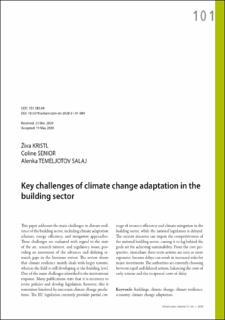| dc.contributor.author | Kristl, Živa | |
| dc.contributor.author | Senior, Coline | |
| dc.contributor.author | Temeljotov Salaj, Alenka | |
| dc.date.accessioned | 2021-10-25T09:37:36Z | |
| dc.date.available | 2021-10-25T09:37:36Z | |
| dc.date.created | 2020-09-05T13:40:22Z | |
| dc.date.issued | 2020 | |
| dc.identifier.citation | Urbani Izziv. 2020, 31 (1), 101-111. | en_US |
| dc.identifier.issn | 0353-6483 | |
| dc.identifier.uri | https://hdl.handle.net/11250/2825260 | |
| dc.description.abstract | This paper addresses the main challenges in climate resilience of the building sector, including climate adaptation schemes, energy efficiency, and mitigation approaches. These challenges are evaluated with regard to the state of the art, research interest, and regulatory issues, providing an assessment of the advances and defining research gaps in the literature review. The review shows that climate resilience mainly deals with larger systems, whereas the field is still developing at the building level. One of the main challenges identified is the institutional response. Many publications state that it is necessary to revise policies and develop legislation; however, this is sometimes hindered by uncertain climate change predictions. The EU legislation currently provides partial coverage of resource efficiency and climate mitigation in the building sector, while the national legislation is delayed. The current situation can impair the competitiveness of the national building sector, causing it to lag behind the goals set for achieving sustainability. From the cost perspective, immediate short-term actions are seen as more expensive, because delays can result in increased risks for major investments. The authorities are currently choosing between rapid and delayed actions, balancing the costs of early actions and the reciprocal costs of delay. Keywords: buildings, climate change, climate resilience, economy, climate change adaptation | en_US |
| dc.language.iso | eng | en_US |
| dc.publisher | Urban Planning Institute of the Republic of Slovenia | en_US |
| dc.relation.uri | https://urbaniizziv.uirs.si/Portals/urbaniizziv/Clanki/2020/urbani-izziv-en-2020-31-01-04.pdf | |
| dc.rights | Navngivelse 4.0 Internasjonal | * |
| dc.rights.uri | http://creativecommons.org/licenses/by/4.0/deed.no | * |
| dc.title | Key challenges of climate change adaptation in the building sector | en_US |
| dc.type | Peer reviewed | en_US |
| dc.type | Journal article | en_US |
| dc.description.version | publishedVersion | en_US |
| dc.subject.nsi | VDP::Urbanisme og fysisk planlegging: 230 | en_US |
| dc.subject.nsi | VDP::Urbanism and physical planning: 230 | en_US |
| dc.source.pagenumber | 101-111 | en_US |
| dc.source.volume | 31 | en_US |
| dc.source.journal | Urbani Izziv | en_US |
| dc.source.issue | 1 | en_US |
| dc.identifier.doi | 10.5379/urbani-izziv-en-2020-31-01-004 | |
| dc.identifier.cristin | 1827526 | |
| cristin.ispublished | true | |
| cristin.fulltext | original | |
| cristin.qualitycode | 1 | |

